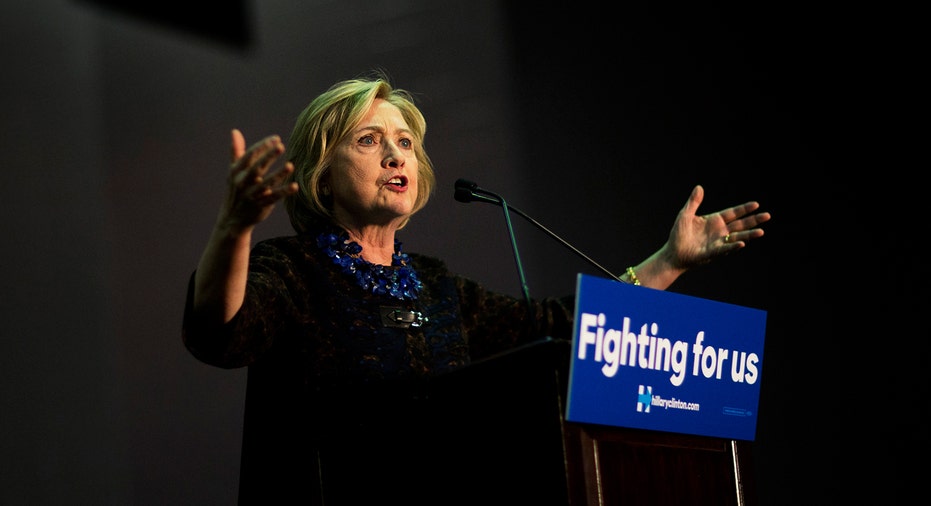Hillary Clinton Zeroes In On African American Support

Democratic presidential front-runner Hillary Clinton is making a push for the African American vote with the launch of her “African Americans for Hillary” campaign.
Last week Clinton traveled to Atlanta, Georgia to speak at the Ministers Luncheon of the 16th Annual Creating Opportunity Conference and followed with a rally at Clark University. There she proposed her agenda to reform the criminal justice system by focusing on incarceration, policing and reentry into society.
“Let's not pretend to ignore hard truths about race and justice in America. We need to say them, own them, and then change them,” said Clinton during the rally. “And that's why I began my campaign with a speech about the need to restore balance and fairness to our criminal justice system.”
Reforming the criminal justice system is one of the key issues for African American voters in 2016 according to Andra Gillespie, Associate Professor of Political Science at Emory University, who specializes in political mobilization and African American politics.
“It would be hard pressed given the events in the last year and a half for a presidential candidate to win Black votes and run a campaign that does not include issues of police brutality, racial profiling and criminal justice reform,” said Gillespie.
“Those issues are so important in today’s society that to not address them would be suicide in terms of winning African American votes.”
For the last 50 years African Americans have historically cast their votes towards the Democratic Party at 90% vs. 10% voting Republican. In the 2008 general election, 95% of African American voters supported Barrack Obama and 93% in 2012. While those numbers are high, Gillespie says Clinton will not easily inherit Obama’s African American votes; she will have to campaign hard to garner that interest and enthusiasm.
“The challenge for Clinton is: Can she mobilize Black voters so that they turn out at the same record setting levels as they did in 2012 and then whether or not she can actually improve that vote share that President Obama did.”
Gillespie says the former Secretary of State might be at a slight disadvantage because she is not co-ethnic like President Obama, who got a lot of support from special interest groups in the African American community due to his racial background.
When it comes to her competition, Vermont Senator Bernie Sanders, Clinton is holding strong. According to an NBC/Survey Monkey poll in October, Clinton is beating Sanders by 54 points among African-Americans. Her support with Black voters is the reason why Clinton retains an impressive overall lead of 45% to 31%.
While many are keeping a close eye on the Iowa and New Hampshire primaries, the real challenge of sealing the deal with African American support is in the South Carolina primary on February 27. Gillespie says Clinton has a better chance at winning the southern vote than Sanders because he represents the progressive wing of the Democratic Party, which has a long-standing tension with African Americans.
“White progressives have tended to emphasize class issues above race issues arguing that class transcends race and be all consuming but African American activists have pointed out for years that there have been ways that race is unique from class in disadvantaging African Americans,” said Gillespie.
She says for a candidate to be successful, they must address racism and structural inequalities that were formulated on a racial line in addition to dealing with class issues.
Self-described “Democratic Socialist” Bernie Sanders has struggled to attract African American supporters. Activists from the "Black Lives Matter" movement have even disrupted Sanders’ campaign appearances as he has toted an “All Lives Matter” message. Gillespie says even if black voters do embrace the Vermont senator’s campaign he will still face the challenge of convincing them he has a chance of winning.
“African American voters are very strategic. In the past they have chosen to side with the candidate that is most likely to win the nomination and have the best chance in the general election. Right now it’s Hillary Clinton.”
In addition to her proposed criminal justice reform, Clinton has also lined up support from African American community leaders including Reverend Jesse L. Jackson, Atlanta Mayor Kasim Reed and Congressman John Lewis (D-GA). Gillespie says those endorsements could translate to grassroots votes.
“We call endorsements ‘influentials.’ They are helpful to people who are skeptical because they reach out to their followers by hitting the pavement, knocking on doors and asking for votes, which is highly effective.”
Most importantly Gillespie says African Americans want to get behind a candidate where their interests are visible and their vote isn’t taken for granted.



















